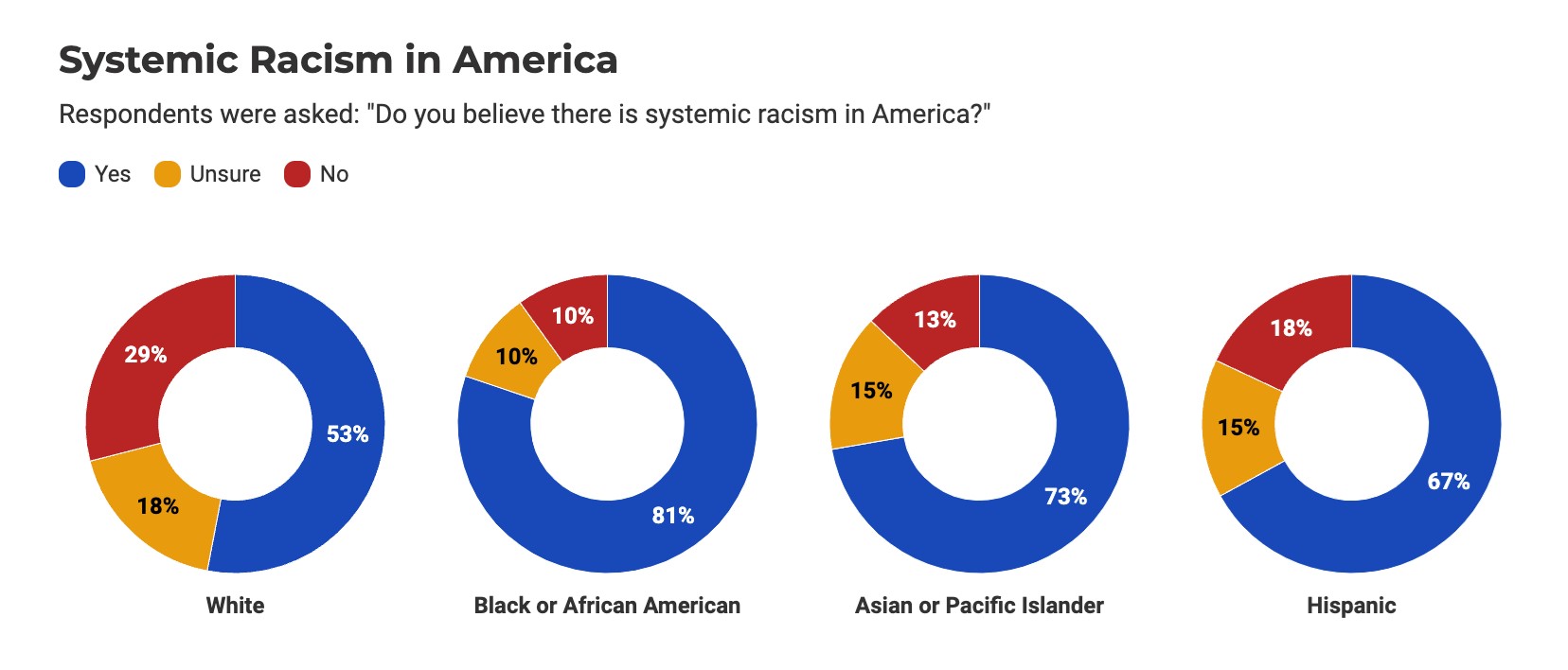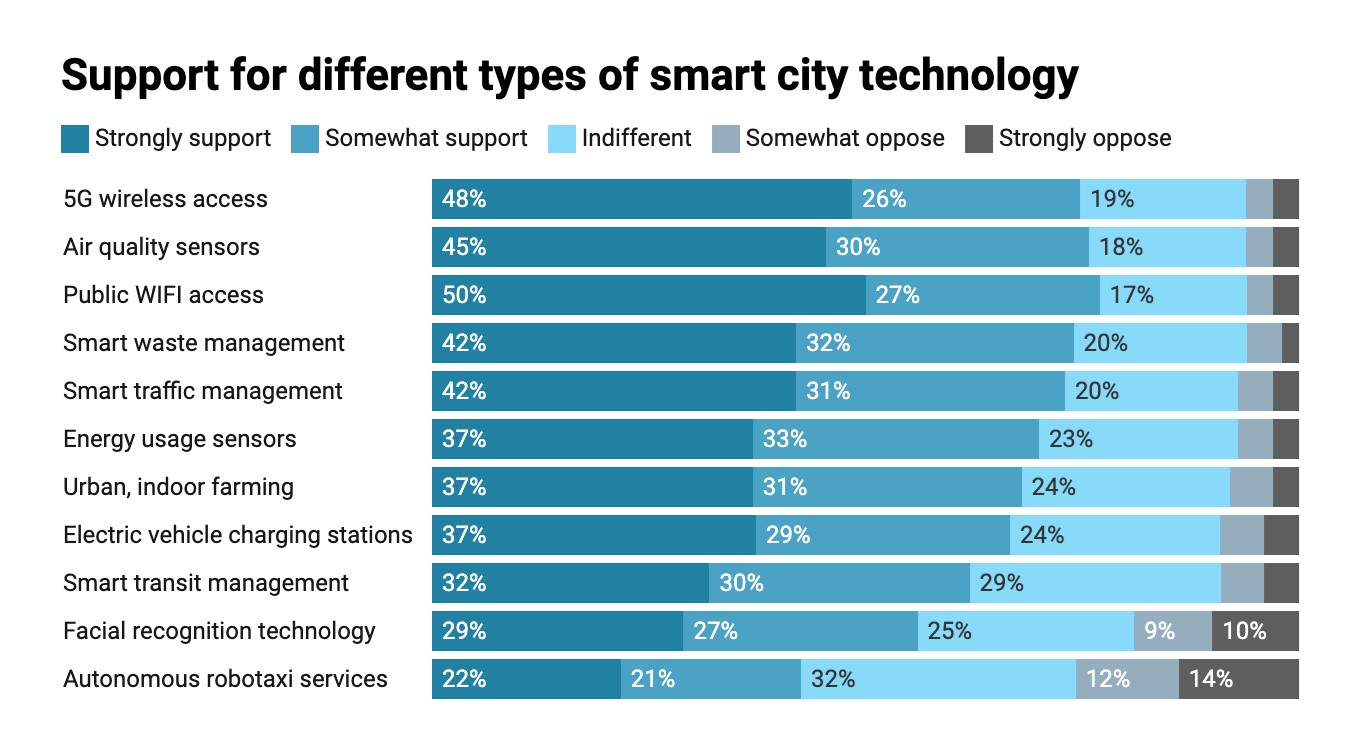DEMOCRATS BEAT MIDTERM EXPECTATIONS DUE TO STRONG TURNOUT
CONFIDENCE IN THE DIRECTION OF THE COUNTRY REMAINS LOW AND BIDEN’S APPROVAL IS FLAT AT 43 PERCENT
DESANTIS’ 2024 PROSPECTS IMPROVE WITH 20 POINT SHIFT AWAY FROM TRUMP AMONG GOP VOTERS
NEW YORK and CAMBRIDGE, Mass. , Nov. 21, 2022 /PRNewswire/ — Stagwell (NASDAQ: STGW) today released the results of the November Harvard CAPS / Harris Poll, a monthly collaboration between the Center for American Political Studies at Harvard (CAPS) and the Harris Poll and HarrisX. Download key results from the poll here.
The poll shows that Democrats outperformed expectations in the midterms as they closed the turnout gap by taking advantage of early voting and driving their core issues of protecting democracy and abortion to be most salient after the economy. On the Republican side, Florida governor Ron DeSantis emerged as a big winner – his support in a 2024 GOP primary increased by 11 points among GOP voters while Donald Trump’s fell 9 points. Nevertheless, Trump still leads the Republican primary choice with 46% support among GOP voters.
Looking ahead to the new government, a strong majority of voters want to curb Congressional spending, and support for Ukraine is fracturing as Republicans and Independents increasingly soften on the rising price tag of supporting the war.
“The midterms didn’t change much, but Democrats did better than many expected because they had the better turnout operation, especially in early voting, and because they successfully put Trump on the ballot – everywhere except for Florida,” said Mark Penn, Co-Director of the Harvard-CAPS Harris Poll and Stagwell Chairman and CEO. “The biggest lesson of the midterms is that swing voters do count – the parties have exhausted their bases, and looking ahead to 2024, the country needs someone who, like Ron DeSantis did in Florida, can achieve unity.”
MIDTERM RESULTS
DEMOCRATS MADE UP THE TURNOUT DEFICIT
- Democrats closed the gap from the pre-election poll which had Likely Voters +3 for the GOP and Registered Voters tied 50-50
- Democrats took advantage of the early and absentee vote: 52% of Democrats voted before Election Day, compared to 45% of Republicans.
- One third of Independents which lean Republican in their choices sat out the election.
- Democrats successfully highlighted their core issues: the economy was the most important issue across the board (42%), but protecting democracy (18%) and abortion (16%) were next.
DESANTIS EMERGES AS WINNER WHILE TRUMP TAKES A HIT
-
- Among GOP voters, Trump’s support in a 2024 primary fell 9 points to 46%, while DeSantis rose 11 points to 28%.
- Voters said the biggest winners of the midterm were the Democratic Party (32%) and DeSantis (15%).
- In a hypothetical 2024 presidential race, DeSantis runs even with Biden and beats Harris by 3 points.
UNHAPPINESS WITH THE DIRECTION OF THE COUNTRY REMAINS IN PLACE
-
- President Biden’s approval is flat at 43 percent.
- A majority of American voters continue to say their financial situation is becoming worse.
- 4 in 10 voters believe the country is in a recession, and another 4 in 10 think it will be in a recession next year.
AMERICAN PRIORITIES FOR NEXT CONGRESS
VOTERS WANT MODERATE SENSIBLE POLICIES
- Roughly 80% of voters agree on each of the following: they want to reduce misinformation on the Internet, they want to curb Congressional spending, and they voted out of concern for issues like the economy, crime, and immigration.
- Voters want the parties to moderate themselves: 62% think the Democrats have moved too far to the left, and 56% think the Republicans have moved too far to the right.
VOTERS EXPECT A SLATE OF INVESTIGATIONS FROM THE NEW HOUSE
- Voters want more clarity on possible political bias: Strong majorities think the House should investigate the Hunter Biden laptop (65%), whether technology companies have been censoring political speech (74%), and whether politics have been affecting the FBI’s actions (77%).
- The January 6 committee continues to be unpopular: 62% of voters want the House to end it.
UKRAINE SUPPORT IS SOFTENING
- Support for costly aid packages is decreasing among Republicans and Independents: 61% of Republicans and 59% of Independents oppose providing another $27 billion in aid to Ukraine.
The November Harvard-CAPS Harris Poll survey was conducted online within the United States from November 16-17, 2022, among 2,212 registered voters by The Harris Poll and HarrisX. Follow the Harvard CAPS Harris Poll podcast at https://www.markpennpolls.com/ or on iHeart Radio, Apple Podcasts, Spotify, and other podcast platforms and sign up to receive the poll monthly at www.harvardharrispoll.com.
About The Harris Poll & HarrisX
The Harris Poll is a global consulting and market research firm that strives to reveal the authentic values of modern society to inspire leaders to create a better tomorrow. It works with clients in three primary areas: building twenty-first-century corporate reputation, crafting brand strategy and performance tracking, and earning organic media through public relations research. One of the longest-running surveys in the U.S., The Harris Poll has tracked public opinion, motivations, and social sentiment since 1963, and is now part of Stagwell, the challenger holding company built to transform marketing.
HarrisX is a technology-driven market research and data analytics company that conducts multi-method research in over 40 countries around the world on behalf of Fortune 100 companies, public policy institutions, global leaders, NGOs and philanthropic organizations. HarrisX was the most accurate pollster of the 2020 U.S. presidential election.
About the Harvard Center for American Political Studies
The Center for American Political Studies (CAPS) is committed to and fosters the interdisciplinary study of U.S. politics. Governed by a group of political scientists, sociologists, historians, and economists within the Faculty of Arts and Sciences at Harvard University, CAPS drives discussion, research, public outreach, and pedagogy about all aspects of U.S. politics. CAPS encourages cutting-edge research using a variety of methodologies, including historical analysis, social surveys, and formal mathematical modeling, and it often cooperates with other Harvard centers to support research training and encourage cross-national research about the United States in comparative and global contexts. More information at https://caps.gov.harvard.edu/.
Media Contact:
Sarah Arvizo
pr@stagwellglobal.com
SOURCE Stagwell Inc.

Related
Articles
Augmented Reality, In the News, Marketing Frontiers
Apr 26, 2024
Legacy Brand, Meet Next-Gen Commerce: Bomb Pop Takes Roblox
Bomb Pop is the most popular ice pop that nobody…
Artificial Intelligence, In the News
Apr 25, 2024
Embracing Comfort Unapologetically with First-Ever AI-Powered La-Z-Boy ‘Decliner’
Building the first-ever AI-powered recliner for the brand that invented…
Augmented Reality
Apr 25, 2024
Playfully Navigating the Google Booth at CES
Google partnered with Left Field Labs to blend its physical…
Newsletter
Sign Up
Celebrates GALE as part of AOY Shortlist
Stagwell – just 1% of the market – is 20% of the AOY list
Observatory Included on the Small AOY Shortlist
NEW YORK – Dec. 12, 2022 – Stagwell (NASDAQ: STGW), the challenger network built to transform marketing, celebrates its strategic and creative agency Anomaly which has been named U.S. Agency of the Year by Adweek, the American trade publication covering the advertising, marketing, and media industries.
Adweek editors applauded Anomaly’s ‘monster’ year of new business wins, which included 16 accounts ranging from Dunkin’, Vans, and the ‘pitch of the year’: Bud Light U.S. Additionally, Adweek said “the agency’s Super Bowl spot for Meta Quest tugged on our heartstrings.”
Business agency GALE – which continued its trajectory of triple-digit growth in 2022 – was also shortlisted by Adweek as U.S. Agency of the Year, one of only 10 agencies recognized. GALE’s notable 2022 new business wins include H&R Block and Dropbox, and it was earlier named to Adweek’s list of Fastest Growing Agencies for 2022.
“Our challenger network – just 1% of the market – boasts 20% of Adweek’s prestigious list. We’re proud to celebrate Anomaly as Adweek’s 2022 Agency of the Year. Led by Carl Johnson, Karina Wilsher and great office leaders in New York and Los Angeles, Anomaly lodged a remarkable year of new business growth and creative innovation. I am also excited to see GALE shortlisted for Agency of the Year and proud of Brad Simms and the fast-growing team there,” said Mark Penn, chairman and CEO, Stagwell. “I also want to congratulate Brendan Shields-Shimizu and the Observatory team on their recognition on the Small Agency of the Year short list for continuing to innovate for clients in a variety of formats.”
“If you define and fully commit to what you believe; identify what must remain and must change, what you’re prepared to do, and more importantly not do, then you can make significant progress in a turbulent, unpredictable world. We do and we did,” noted Anomaly co-founder Carl Johnson.
Observatory, based in Los Angeles, was also included on the shortlist in the U.S. Small Agency of the Year category, recognized for selling a variety of work including an action figure of Martha Stewart, two docuseries, a podcast, a film, and a concert. It also received nods for developing 15 sports films for clients as well as creating a sequel to an iconic Chipotle ad.
About Stagwell
Stagwell is the challenger holding company built to transform marketing. We deliver scaled creative performance for the world’s most ambitious brands, connecting culture-moving creativity with leading-edge technology to harmonize the art and science of marketing. Led by entrepreneurs, our 13,000+ specialists in 34+ countries are unified under a single purpose: to drive effectiveness and improve business results for their clients. Join us at www.stagwellglobal.com.
Related
Articles
Augmented Reality, In the News, Marketing Frontiers
Apr 26, 2024
Legacy Brand, Meet Next-Gen Commerce: Bomb Pop Takes Roblox
Bomb Pop is the most popular ice pop that nobody…
Artificial Intelligence, In the News
Apr 25, 2024
Embracing Comfort Unapologetically with First-Ever AI-Powered La-Z-Boy ‘Decliner’
Building the first-ever AI-powered recliner for the brand that invented…
Augmented Reality
Apr 25, 2024
Playfully Navigating the Google Booth at CES
Google partnered with Left Field Labs to blend its physical…
Newsletter
Sign Up
By: Ray Day
CONTACT:
We wanted to share our latest consumer and business insights, based on research from The Harris Poll, a Stagwell agency.
Among the highlights of wave 142 (fielded Nov. 11-13) in our weekly consumer sentiment tracking:
WORRIES MODERATE ACROSS THE BOARD:
Today, 86% of Americans are concerned about the economy, inflation and jobs – down 2 points from last week. In fact, all worries we track moderated this week.
-
- 83% worry about a potential U.S. recession (down 1 point)
- 80% about U.S. crime rates (down 4 points)
- 72% about political divisiveness (down 3 points)
- 71% about affording their living expenses (down 5 points)
- 70% about the War on Ukraine (down 2 points)
- 56% about a new COVID-19 variant (down 3 points)
- 45% about losing their jobs (down 3 points)
- 40% about the Monkeypox outbreak (down 4 points)
INFLATION KEEPS GEN Z LIVING AT HOME:
Inflation and uncertain economic times are keeping more than half of Gen Z living at home with their parents, according to our study with DailyPay.
-
- 54% of 18-to 25-year-olds have made the choice to live with their parents given the current economic climate.
- Only 28% say they are typically able to pay all of their bills on time.
- 80% feel the economy will either stay the same or decline during the next 12 months.
- 41% are worried it will be tougher to pay bills due to high inflation, and 38% are concerned it will make buying staples/food more challenging.
- 78% say they have been able to save less money.
- One solution: 72% of employed Gen Z members say having access to their pay every day – as opposed to waiting until a scheduled payday – would help them pay bills on time.
LARGE NUMBER OF AMERICANS NOT CONVINCED RACISM IS AN ISSUE:
Despite the toll the pandemic and its economic fallout have had on communities of color during the last two years, more than 40% of Americans today are not convinced that systemic racism exists, according to our “The State of Equity In America” report with U.S. News & World Report.
-
- In fact, nearly a quarter of Americans believe there absolutely is not systemic racism in America, while another 17% are unsure.
- Nearly half (47%) of White Americans remained unconvinced.
- More than 80% of Black Americans believe it does, as well as more than 70% of Asian or Pacific Islanders and nearly 70% of Hispanics.
- For business: Only about one fifth to one quarter of respondents believe companies have put in a “very good effort” during the past two years to advance racial equity.
- Both White Americans and people of color have less trust in government to make meaningful changes in advancing equity and more faith in small businesses, nonprofits, and educational and health care entities.
- Among people of color, 73% trust small businesses to some degree to advance equity – the highest level of support given to a range of institutions that also included corporations and religious groups – as do 78% of White Americans.
MORE THAN HALF OF AMERICANS READY TO BUY AN EV:
The scales continue tipping toward electric vehicles – with 51% of U.S. adults saying they would like to buy an electric vehicle as their next car, according to our survey with Protocol.
-
- Millennials are the most likely to be ready, with 61% saying they want an EV.
- 72% of all people think EVs will become more common than traditional gas-powered vehicles in their lifetime.
- We also surveyed consumers on their attitudes toward public transit as an alternative mode of transport. A quarter of all respondents report regularly using public transportation, with the largest segment in the Northeast.
- 64% view public transportation where they live as trustworthy.
- 38% of U.S. adults are less willing to use public transportation post-COVID, including 44% of Northeast residents.
- 46% of Gen Z respondents are less willing to use public transit as a result of the pandemic.
CHARITIES INSULATED FROM INFLATION CUTBACKS:
One in four Americans are increasing charitable giving due to inflation, according to our survey with Vanguard Charitable. In addition, more than half (60%) of American donors say rising inflation is having no impact on their giving.
-
- 45% of American donors have an annual charitable giving budget, similar to the year prior (44%).
- 74% of Americans donated to charity in past 12 months, with younger Americans (ages 18-44) being more likely to say they donated more money than they normally would as a result of inflation, compared to older Americans (ages 45+) (18% for younger versus 8% for older).
- 86% of Americans who have a charitable giving budget say it is important for them to support charities financially during times of economic uncertainty.
- Donors who have a charitable giving budget are two times more likely to say they plan to give more than normal compared with donors without a charitable giving budget (20% versus 10%).
ICYMI:
In case you missed it, check out some of the thought-leadership and happenings around Stagwell making news:
As always, if helpful, we would be happy to provide more info on any of these data or insights. Please do not hesitate to reach out.
Thank you.
Related
Articles
Augmented Reality, In the News, Marketing Frontiers
Apr 26, 2024
Legacy Brand, Meet Next-Gen Commerce: Bomb Pop Takes Roblox
Bomb Pop is the most popular ice pop that nobody…
Artificial Intelligence, In the News
Apr 25, 2024
Embracing Comfort Unapologetically with First-Ever AI-Powered La-Z-Boy ‘Decliner’
Building the first-ever AI-powered recliner for the brand that invented…
Augmented Reality
Apr 25, 2024
Playfully Navigating the Google Booth at CES
Google partnered with Left Field Labs to blend its physical…
Newsletter
Sign Up

Panchawati has joined the Content and Strategy leadership team and will be based in Singapore
NEW YORK and SINGAPORE, Nov. 15, 2022 /PRNewswire/ — National Research Group (NRG), recognized as an insights leader at the edge of technology, content, and culture, today announced that Sushma Panchawati, a veteran insights strategist and emerging markets specialist, has been appointed Senior Vice President, Content & Strategy. She will oversee the firm’s presence in the Asia-Pacific (APAC) region. NRG is part of Stagwell (NASDAQ: STGW), the challenger network built to transform marketing.
In her new role, Panchawati will work closely with both existing and new clients across the streaming, television, and theatrical landscapes, leading brand health, concept evaluation, messaging and positioning, content testing, and creative material testing.
“Now is a really exciting time to be working on the content landscape in Asia-Pacific given the discernible impact it has been having on the world at large for the last decade. I am very excited to help our clients take it to new heights by tapping into the rich multi-cultural tapestry here and to be part of NRG’s journey in the region,” said Panchawati.
Panchawati has more than 15 years of experience working in product and marketing strategy. Most recently, she was part of the founding team at Edvanza, a career advancement partner for young professionals. There, she led the design and delivery of the company’s MVP product proposition, as well as the foundational business and marketing strategy, driving growth in the UK, Africa, and India. Before that, Panchawati led the APAC region for The Sound, a brand strategy and product innovation agency. She has led strategy and research efforts across APAC, EU, Africa, and South America working with brands like Google, Pinterest, Netflix, Amazon, and Apple on their brand launch campaigns, marketing and product strategies, and innovation pipelines.
“With established markets maturing, Asia-Pacific is a region of particular importance for many of our entertainment clients. However, its diverse range of cultures and tastes means that success will depend on bespoke marketing strategies. Sushma’s deep expertise and unique perspective across the region will be invaluable to our clients as they navigate the opportunities ahead,” said Stephen Palmer, President, Content & Strategy.
Panchawati earned her undergraduate degree from Jawaharlal Nehru Technology University and a master of business administration from MICA in India. She is a regular speaker at global conferences like the European Society for Opinion and Marketing Research (ESOMAR), highlighting her experience working across a diverse set of markets and methodologies. She will be based in Singapore.
National Research Group is a leading global insights and strategy firm at the intersection of entertainment and technology. Rooted in four decades of industry expertise, the world’s leading marketers turn to us for insights into growth and strategy for any content, anywhere, on any device. Working at the confluence of content, culture and technology, NRG offers insights for bold storytellers everywhere. To learn more, please visit www.nationalresearchgroup.com, and follow us on LinkedIn and Instagram.
Stagwell is the challenger network built to transform marketing. We deliver scaled creative performance for the world’s most ambitious brands, connecting culture-moving creativity with leading-edge technology to harmonize the art and science of marketing. Led by entrepreneurs, our 13,000+ specialists in 34+ countries are unified under a single purpose: to drive effectiveness and improve business results for their clients. Join us at www.stagwellglobal.com.
For NRG:
Mary Moczula
mary.moczula@nrgmr.com
For Stagwell:
Sarah Arvizo
pr@stagwellglobal.com
Related
Articles
Augmented Reality, In the News, Marketing Frontiers
Apr 26, 2024
Legacy Brand, Meet Next-Gen Commerce: Bomb Pop Takes Roblox
Bomb Pop is the most popular ice pop that nobody…
Artificial Intelligence, In the News
Apr 25, 2024
Embracing Comfort Unapologetically with First-Ever AI-Powered La-Z-Boy ‘Decliner’
Building the first-ever AI-powered recliner for the brand that invented…
Augmented Reality
Apr 25, 2024
Playfully Navigating the Google Booth at CES
Google partnered with Left Field Labs to blend its physical…
Newsletter
Sign Up
By: Ray Day
CONTACT:
We wanted to share our latest consumer and business insights, based on research from The Harris Poll, a Stagwell agency.
Among the highlights of wave 141 (fielded Nov. 4-6) in our weekly consumer sentiment tracking:
ECONOMY, INFLATION WORRIES TICK BACK UP:
Today, 88% of Americans are concerned about the economy, inflation and jobs – up 2 points from last week. Worries about affording living expenses, in particular, jumped significantly.
-
- 84% worry about a potential U.S. recession (up 1 point)
- 88% about the economy and inflation (up 2 points)
- 84% about U.S. crime rates (up 2 points)
- 76% about affording their living expenses (up 4 points)
- 75% about political divisiveness (up 1 point)
- 72% about the War on Ukraine (no change)
- 59% about a new COVID-19 variant (down 3 points)
- 48% about losing their jobs (down 6 points)
- 44% about the Monkeypox outbreak (down 4 points)
AMERICANS REGRET NOT SWITCHING JOBS SOONER:
Job seekers regret not starting their job searches sooner, as layoffs and freezes in tech threaten to expand to other sectors, according to our survey with Bloomberg.
-
- 71% of those looking to switch jobs say the job search today is more complicated than anticipated.
- 63% say they’ve searched for a new job for more than six months, and 48% report applying to more than 50 positions.
- 72% of job seekers say that companies are acting like they don’t want to hire, including ignoring applications and failing to schedule interviews.
- 66% say they regret not starting the search sooner, while 63% admit it would have been easier to switch jobs a year or two ago.
- 51% of job seekers agree that, at this point, they would take nearly any job offer.
TWITTER: A TALE OF MANY VIEWS:
In light of Elon Musk’s Twitter takeover, we find both critics and fans – something brands might want to remember as they consider pausing spending on the platform, according to our survey with USA Today.
-
- Female (63%) Twitter users are less likely to support Musk’s ownership than men (70%).
- Gen Z users also are more likely to believe Musk will hurt Twitter’s product quality (53%), freedom of the press (44%) and free speech on the internet (37%) compared with older users.
- Both women (28% willing) and Gen Z (35%) would be less willing to pay a monthly subscription fee than men (44%) and Millennials (53%).
- Yet 67% of Twitter users support Musk owning Twitter, especially Republicans (79%), parents with minor children (74%), urban residents (72%), men (70%) and Millennials (70%).
- 84% of Americans find free speech on social media important, and the majority of Republicans (57%), men (56%), rural (55%) and white Americans (53%) find it “very important.”
- Frequent Twitter users, including Republicans (42% versus Democrats at 32%), Millennials (40% versus Gen Z at 26%), men (36% versus women at 26%) and Black Americans (36% versus white at 32%) say they’ll now spend more time on the platform that Musk owns it (versus all Twitter users at 31%).
AMERICANS SAY SMART CITIES DON’T NEED AUTOMOUS TAXIS:
In partnership with Emerging Tech Brew, we found that 87% of city residents found it essential for their city to invest in emerging technologies – but not every resident supports each tech initiative equally.
-
- Most intelligent city technologies – such as public WiFi access, 5G wireless access, smart traffic management, facial recognition technology and air quality sensors – has solid support from city residents. The exception is autonomous robotaxi services, which less than half support (43%).
- Overall, Gen Z and Millennial city residents report being more aware of smart city tech, as well as much more likely to use the tech weekly compared to older residents (Gen Z 44% and Millennials 51% versus Gen X 37% and Boomers 16%).
- Those in cities with metro areas of less than 1 million tend to view such tech as less critical than their larger-city counterparts.
- Smaller-city residents also are less likely to view their cities as particularly innovative, with just 16% saying they find their city very innovative, compared to 43% for larger cities.
- 48% of Boomers said they never use smart city tech, while 27% of Gen X respondents said the same.
- That compares with only 13% of Millennials and 7% of Gen Z who say they never use smart city tech.
ICYMI:
In case you missed it, check out some of the thought-leadership and happenings around Stagwell making news:
As always, if helpful, we would be happy to provide more info on any of these data or insights. Please do not hesitate to reach out.
|
|
Thank you.
Related
Articles
Augmented Reality, In the News, Marketing Frontiers
Apr 26, 2024
Legacy Brand, Meet Next-Gen Commerce: Bomb Pop Takes Roblox
Bomb Pop is the most popular ice pop that nobody…
Artificial Intelligence, In the News
Apr 25, 2024
Embracing Comfort Unapologetically with First-Ever AI-Powered La-Z-Boy ‘Decliner’
Building the first-ever AI-powered recliner for the brand that invented…
Augmented Reality
Apr 25, 2024
Playfully Navigating the Google Booth at CES
Google partnered with Left Field Labs to blend its physical…
Newsletter
Sign Up
By: Ray Day
CONTACT:
We wanted to share our latest consumer and business insights, based on research from The Harris Poll, a Stagwell agency.
Among the highlights of wave 140 (fielded Oct. 28-Oct. 30) in our weekly consumer sentiment tracking:

ECONOMY, INFLATION WORRIES MODERATE; JOB WORRIES JUMP:
Today, 86% of Americans are concerned about the economy, inflation and jobs – down 3 points from last week. At the same time, worries about losing a job jumped significantly.
-
- 83% worry about a potential U.S. recession (down 2 points)
- 82% about U.S. crime rates (no change)
- 74% about political divisiveness (down 1 point)
- 72% about the War on Ukraine (down 2 points)
- 72% about affording their living expenses (no change)
- 62% about a new COVID-19 variant (up 1 point)
- 54% about losing their jobs (up 7 points)
- 48% about the Monkeypox outbreak (up 4 points)
INFLATION AT THE NORTH POLE:
Eight in 10 (84%) Americans plan to buy gifts for others this holiday season, and they have set their 2022 gift-giving budget at $823, according to our survey with NerdWallet.
-
- Close to a third (31%) of last year’s holiday shoppers are still in debt after using a credit card to pay for gifts they still haven’t paid off.
- 72% of this year’s holiday shoppers will use credit cards, charging $663 on average.
- Inflation is affecting how some shoppers approach gift-giving this year: 83% plan to adjust as a result of inflation, including giving different types of gifts compared to years past (36%) and spending less per person compared to years past (35%).
- 43% say they feel pressure to spend more money on holiday gifts than they’re comfortable spending.
- 68% plan to shop Black Friday/Cyber Monday sales this year.
- 50% say they’ll spend the most on gifts while shopping these sales.
- Still, 30% plan to use Black Friday/Cyber Monday sales to buy necessities for their home or family.
- 67% say they will do their holiday shopping online instead of in-store this year.
OPEN ENROLLMENT BELT-TIGHTENING:
It’s healthcare open-enrollment season, and many workers are considering downgrading their health insurance because of high inflation, according to our survey with the Nationwide Retirement Institute.
-
- 17% of respondents in the last 12 months adjusted their family’s budget to pay for health care expenses.
- 12% canceled or changed health insurance.
- 10% withdrew funds from their retirement account to pay for health care expenses.
- 8% downgraded their health insurance plan.
- 14% of Americans say they are considering downgrading their health insurance plan during this year’s open enrollment – rising to 23% for Gen Z and 20% for Millennials.
- Americans also are experiencing high levels of stress around retirement and retirement planning because of inflation: 47% report their top stressor is inflation, 30% worry about Social Security running out of funds, and 29% are concerned about an unexpected decline in their health.
EMPLOYEES’ ADVICE TO HR: LESS IS MORE:
When it comes to HR tech platforms to improve the work experience, less is more, according to our survey with HR Brew.
-
- On average, employees report using 3.4 HR platforms and 8.1 total HR and productivity tools in general.
- 69% of employees with one HR platform said they felt confident they could find the information they need.
- Confidence plummeted to 49% among those whose company has more than one HR platform.
- In today’s economic climate, employees have an appetite for financial planning solutions (80% favorability among Millennials and 72% among Gen X) and the lowest need for new social networking tools.
INTEREST IN WOMEN’S SPORTS CLIMBING:
The popularity of women’s sports has grown by leaps and bounds – and consumers want to see the trend continue, according to Stagwell’s National Research Group’s new report, Leveling the Playing Field.
-
- In the U.S., 3 in 10 sports fans say they’re watching more women’s sports now than they were five years ago.
- The broadcast market for women’s sports grew significantly worldwide this year, thanks in part to successful events like the UEFA European Women’s Championship and ICC Women’s Cricket World Cup.
- Even in the U.S., which didn’t compete in those tournaments, the market grew by 29% compared with 2021.
- 85% of fans – including 79% of men – think that it’s important for women’s sports to continue to grow in popularity.
- The Olympics proved there’s growing demand for women’s sports. During the Tokyo Games, in half of the 10 most widely viewed sports, viewership for women’s events was higher than men’s.
ICYMI:
In case you missed it, check out some of the thought-leadership and happenings around Stagwell making news:
As always, if helpful, we would be happy to provide more info on any of these data or insights. Please do not hesitate to reach out.
Related
Articles
Augmented Reality, In the News, Marketing Frontiers
Apr 26, 2024
Legacy Brand, Meet Next-Gen Commerce: Bomb Pop Takes Roblox
Bomb Pop is the most popular ice pop that nobody…
Artificial Intelligence, In the News
Apr 25, 2024
Embracing Comfort Unapologetically with First-Ever AI-Powered La-Z-Boy ‘Decliner’
Building the first-ever AI-powered recliner for the brand that invented…
Augmented Reality
Apr 25, 2024
Playfully Navigating the Google Booth at CES
Google partnered with Left Field Labs to blend its physical…
Newsletter
Sign Up
By
Connie Lin,
Fast Company
CONTACT
hello@stagwellglobal.com
SIGN UP FOR OUR INSIGHTS BLASTS
Nigeria sits at Africa’s heart: Geographically, it’s nestled middle-left of the curve in the kidney bean-shaped land mass, and its economy boasts the highest GDP on the continent (nearing $450 billion in 2021). The pulse of the country beats with the pace of rapid transformation. It harbors the world’s sixth-largest population, which is also among the fastest growing, projected to surpass the United States by 2050.
It’s a country of strivers, on the verge of reinventing itself—and it has fluxed socially and culturally in recent years. But one constant anchor is the promise of the internet in delivering a better future, reveals a new report from the National Research Group (NRG), a division of global marketing firm Stagwell.
Over the summer, NRG partnered with a media agency based in Lagos, the country’s largest city, to dive deep into the Nigeria’s shifting landscape—one that, despite its position at the heart of Africa, is still a mystery to much of the Western world (if not to the East—where it has caught the eye of economic powerhouses like China, which has poured millions into Nigerian infrastructure to cement strategic trade partnerships).
The report is the first in a series focusing on high-growth emerging markets, and draws from a June-July survey of 5,000 Nigerian consumers, ages 16 to 64, whose responses were interwoven with commentary from academics and industry experts. It sketches the portrait of a country reenergized by young blood, that has lagged on technological development in many ways, but now hopes to leapfrog into the digital race.
NEW DIGITAL NATIVES, CONNECTED BY SMARTPHONES
First and foremost, it notes: Nigeria runs on mobile technology. According to the data, 92% of people in the country own a smartphone, and the device dominates as a mode of entertainment for most. Over half (55%) of all TV shows and movies are watched on smartphones, and the vast majority (83%) of gaming is played on them as well. As NRG’s content and strategy executive Kerri Norton explains to Fast Company, this is partly out of economic necessity. Some Nigerians don’t have other devices for streaming. Laptop ownership is at 70%, and desktop computer ownership is significantly lower at 16%. Less than 30% own tablets or smart TVs, and only 15% own gaming consoles.
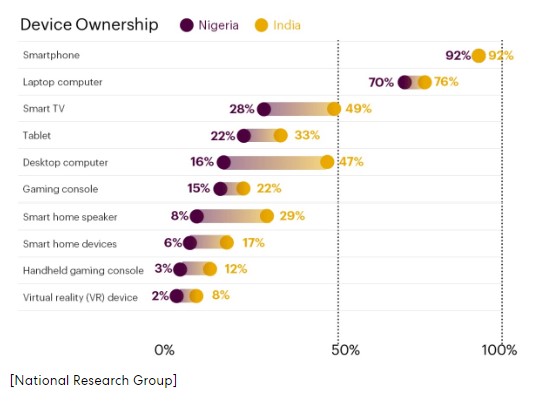
But beyond that, mobile is a godsend for Nigerians living with the state’s still relatively poor electricity infrastructure, says Samuel Odusami of SBI Media, the Nigeria-based agency that served as NRG’s local partner on the ground. “Because [Nigerians] don’t have access to uninterrupted power 24/7, mobile technology has become their savior,” says Odusami, adding that power-bank businesses have boomed in Nigeria, helping many stay wired to the internet for longer, on the road or at home, when the grid is down.
Consequently, the often-slow speed of internet is viewed as the biggest tech problem in the market, one that many hope the 5G revolution will solve. Nearly 70% of those surveyed are aware of the impending 5G rollout, and 81% of Nigerians believe it will “transform my country for the better.” In rural and low-income communities, where internet connections are spottiest, many believe 5G offers a chance to “catch up,” as faster streaming translates into more business productivity, the report notes.
“It’s a democratization of access across all socioeconomic classes,” says Anas Ghazi, Stagwell’s chief strategy officer. “It’s allowed for an entrepreneur mindset, as Nigeria [pursues] its largest revenue generation in the next five years.”
THE SKITMAKER HUSTLE
That entrepreneurial spirit of capitalism and “hustle culture” has long reigned in Nigeria, even as unemployment rates increased and the economy struggled. But now, it’s being supercharged by Nigeria’s largest population of youth in the world—skewing the country’s median age to just 18 years old—who have seized upon the internet as a way out of the well. “It’s a window of opportunity for young people,” says Odusami, who cites a rising generation of so-called skitmakers as proof.
Nigerian skitmakers create social media content, but they do it without the popular influencer luxuries—studios to shoot videos, or pricy tools for animation—choosing to invest only in a high-end smartphone, perhaps an iPhone or Samsung Galaxy, to stitch together content for YouTube, TikTok, and other platforms.
The goal is to go viral, and many have flocked to try. The country now has a nest of creators numbering in the thousands—including some with millions of views, says Odusami—who have used their success as a springboard to start full-fledged production companies, even in the mainstream movie industry. Collectively, skitmaker startups employ close to 5,200 people, he says. Among the most prominent is Mr Macaroni, who broke through with YouTube comedy and now tours the world promoting Nigerian issues.
For those who don’t strike it big, skitmaking might be just one of many enterprises. “Even people with 9 to 5 jobs have what we call ‘side hustles,’” says Odusami. “In Nigeria, you can’t [support] a family without multiple streams of income.” They might start blogs or YouTube channels, or they might start a business that has nothing to do with social media—but the internet remains a through line. Learning to code, or leveraging e-commerce to sell Nigerian cuisine in foreign countries, are among the examples he cites.
But despite the hustle, Nigerians still feel “behind” on tech development, NRG’s report finds. Only one in three survey respondents said their country was currently “very innovative,” compared to over half of respondents in India, which served as a pseudo-control group for the study.
According to Odusami, Nigerians hope the grind can help bridge the gap. “They are hungry to feed themselves,” he says. “Hungry to make a name, hungry to become financially independent.”
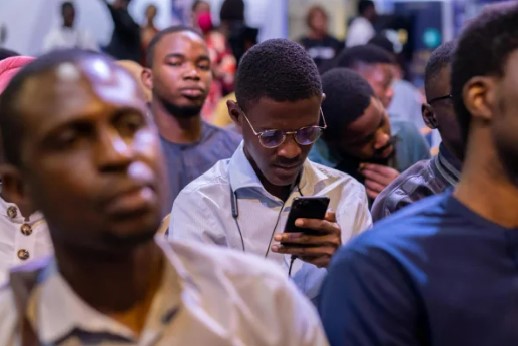
CRYPTO UNLOCKED
As businesses grew, Nigerians needed a way to accept payments globally—something that wasn’t possible with PayPal, Google Pay, or other legacy platforms. That ignited a boom in enthusiasm for cryptocurrencies and blockchain technology, one that has dwarfed awareness of crypto in the United States. In Nigeria, 90% responded that they were aware and knowledgeable about cryptocurrencies, while 71% said the same for the blockchain and 59% for NFTs. (In a November 2021 Pew Research report, only 24% of Americans said they had heard “a lot” about crypto.)
“Now you have businesses who accept payments in crypto, in stablecoins like USDC and Binance Coin,” says Odusami. But even as people began to adopt crypto for everyday goods like groceries and taxi rides, the Nigerian government’s central bank in 2021 began to restrict Bitcoin services in the country. According to a recent joint report from the Organisation for Economic Co-Operation and Development (OECD) and the United Nations, the crackdown crippled “millions of young Nigerians” who were making money from crypto trading. However, the report also suggested that some found a way to “lawfully bypass these restrictions and continue the business.” The same month, crypto exchange KuCoin reported that 33 million Nigerians had owned or traded crypto in the last half year.
According to Odusami, 20 to 30 global crypto exchanges have a presence in Nigeria and are actively targeting Nigerian customers—including Binance, which is a client of SBI Media in five African countries.
Meanwhile, the hustle has moved onto the blockchain. Odusami cites the story of a Nigerian man who created his own NFT project from photos of drummers at a traditional Nigerian wedding ceremony—a cultural rite beloved not just in dance, but also as a musical retelling of the betrotheds’ mothers and fathers through the years. The man made a killing—and returned to the ceremonial village to give the drummers 70% of the proceeds.
BIG TECH’S SWAY
According to the survey, Silicon Valley Big Tech companies (including social media) wield tremendous influence in Nigeria, with their command of the culture second only to religious institutions. It tops that of colleges and universities, as well as the government, and both Hollywood and Nollywood.
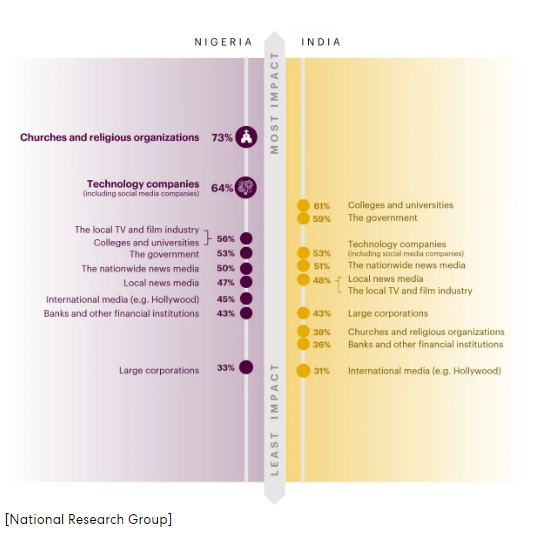
It’s perhaps no surprise that giants of crypto and social media—which have speckled reputations in the States—are viewed much more positively in Nigeria, because, as Norton explains, the impact of both technologies within the country has been overwhelmingly positive. It offers freedom of entrepreneurship and liberation from circumstances, a lifeline that keeps Nigerians afloat, and working, and connecting with the rest of the world. It might even have the power to combat corrupt governments and state overreach.
But Nigeria is young, and it will still have to fight for its place in a competitive world. “Nigeria is on the map to grow significantly over the next 10, 15, even 5 years,” says Norton. “They want to be where the future is.”
So, it hustles on.
Related
Articles
Augmented Reality, In the News, Marketing Frontiers
Apr 26, 2024
Legacy Brand, Meet Next-Gen Commerce: Bomb Pop Takes Roblox
Bomb Pop is the most popular ice pop that nobody…
Artificial Intelligence, In the News
Apr 25, 2024
Embracing Comfort Unapologetically with First-Ever AI-Powered La-Z-Boy ‘Decliner’
Building the first-ever AI-powered recliner for the brand that invented…
Augmented Reality
Apr 25, 2024
Playfully Navigating the Google Booth at CES
Google partnered with Left Field Labs to blend its physical…
NRG Releases Whitepaper, “The Power of Brand Fandom: 5 Things to Know Right Now”
NEW YORK, Oct. 31, 2022 /PRNewswire/ — Research from Stagwell‘s (NASDAQ: STGW) National Research Group (NRG), a global insights leader at the intersection of technology, content, and culture, shows more people are fans of brands, products, and services in the same way they love sports and celebrities. NRG introduced its “Brand Fandom” research focus at Advertising Week, beginning a series that will unpack the journey to fandom across key categories and audiences. The research will explore the pathways for brands to successfully build and activate a fan community and understand the modern-day fan ecosystem.
NRG’s Brand Fandom showed up in a myriad of ways this month:
- Brand Fandom Whitepaper: In a new report, “The Power of Brand Fandom: 5 Things to Know Right Now,” research points to brand influence as being more significant than other commonly associated areas of interest: consumers are bigger fans of brands or products (57%) than of celebrities (54%), movies (52%), sports (48%) or online influencers/personalities (37%). Some other key themes from the paper include:
- Age is just a number: Brand fandom is strong across all ages, dispelling conventional assumptions that Gen Z and millennials have a fleeting sense of brand loyalty.
- Fans don’t exist in a vacuum: 54% “want everyone to know” they are a fan of a given brand or product.
- Brand fans are sold on potential, too. Over three-quarters (77%) say they will at least try different products the brand comes out with.
- MediaPost Op-Ed: In a contributed piece, Stagwell Global Chief Marketing Officer Ryan Linder and NRG EVP, Brand Strategy and Innovation Fotoulla Damaskos co-bylined an article, “Bigger Than Sports and Celebrity: The Power of Brand Fandom,” which explores what brands can expect of the consumers who they turn into fans: not just deep loyalty, but advocacy.
- Advertising Week New York: A panel at AWNY, which included NRG’s Damaskos and EVP, Head of Sports Marketing Jay Kaufman; Stagwell’s Linder; Christie’s SVP, Head of Marketing Neda Whitney; and McDonald’s Director, Communications Measurement & Insights Sarah Myles, introduced brand fandom on “Buzz and Devotion: The Fan Economy That Makes Niche Mainstream in Today’s Culture.”
“This first piece of research shows how brand fandom serves as a tool of self-expression, intricately linking brands to consumer identities. It should signal to brands that interactions with customers have to be dialogues, nurturing people’s experiences and engendering a sense of shared belonging,” said NRG EVP, Brand Strategy & Innovation Fotoulla Damaskos. “Our choices as consumers are on full display right now – we can wield power against the brands that fail us, or passionately champion those we believe in. Where these choices fall can mean the difference between having customers or having fans who bring commitment, advocacy and long-term brand growth.”
“The way I move about the world – how I approach the fast-paced work of brand marketing, to the even faster-paced world of fatherhood – I’ve done through the lens of authenticity and grit, qualities I adopted from my fandom for Harley-Davidson motorcycle culture,” said Stagwell EVP, CMO Ryan Linder. “My identity continues to be reinforced by a kaleidoscope of brands I’m personally invested in, proof that the influence of brands can manifest across so many aspects of our lives.”
Data used in this report comes from a study of 1,018 US consumers, ages 18 to 65, conducted in October 2022–representative of the national population in terms of age, gender and ethnicity.
National Research Group is a leading global insights and strategy firm at the intersection of entertainment and technology. Rooted in four decades of industry expertise, the world’s leading marketers turn to us for insights into growth and strategy for any content, anywhere, on any device. Working at the confluence of content, culture and technology, NRG offers insights for bold storytellers everywhere. To learn more, please visit www.nationalresearchgroup.com, and follow us on LinkedIn and Instagram.
Stagwell is the challenger network built to transform marketing. We deliver scaled creative performance for the world’s most ambitious brands, connecting culture-moving creativity with leading-edge technology to harmonize the art and science of marketing. Led by entrepreneurs, our 13,000+ specialists in 34+ countries are unified under a single purpose: to drive effectiveness and improve business results for their clients. Join us at www.stagwellglobal.com.
Stagwell’s fastest-growing network transforms for the convergence of creative, media, and commerce.
Related
Articles
Augmented Reality, In the News, Marketing Frontiers
Apr 26, 2024
Legacy Brand, Meet Next-Gen Commerce: Bomb Pop Takes Roblox
Bomb Pop is the most popular ice pop that nobody…
Artificial Intelligence, In the News
Apr 25, 2024
Embracing Comfort Unapologetically with First-Ever AI-Powered La-Z-Boy ‘Decliner’
Building the first-ever AI-powered recliner for the brand that invented…
Augmented Reality
Apr 25, 2024
Playfully Navigating the Google Booth at CES
Google partnered with Left Field Labs to blend its physical…
Newsletter
Sign Up
By
Harris Brand Platform
CONTACT
hello@stagwellglobal.com
SIGN UP FOR OUR INSIGHTS BLASTS
A Size-Inclusive Rollout Shrinks Earnings, but Not Brand Equity
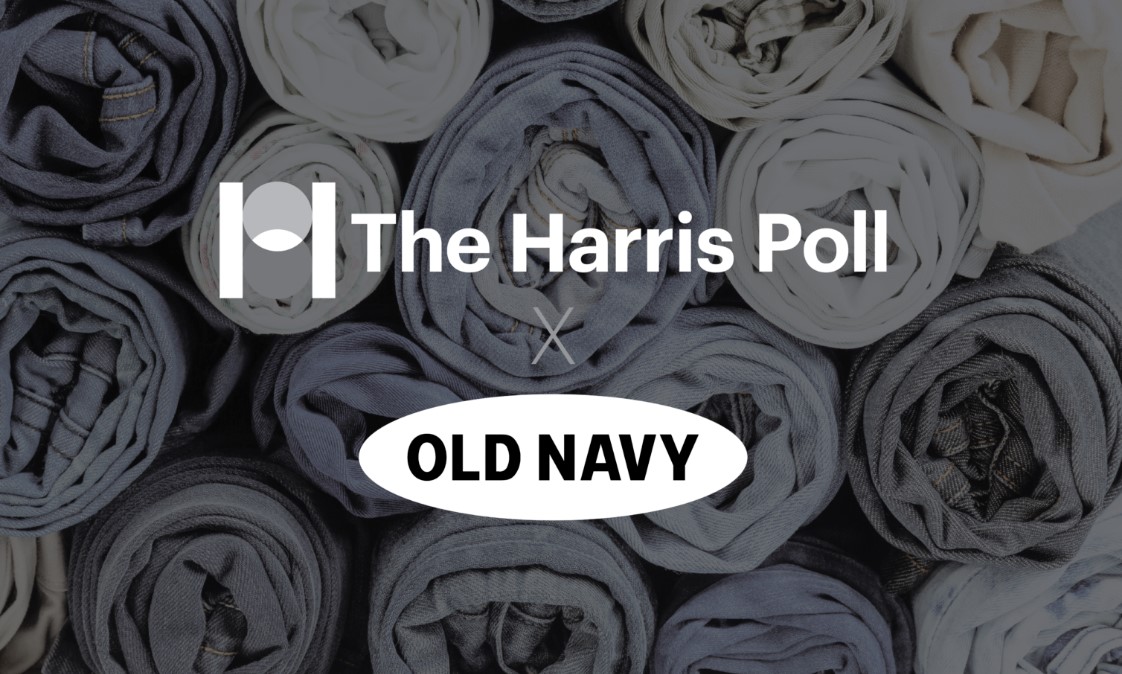
In August 2021, Old Navy launched BODEQUALITY, a campaign that expanded their clothing line to serve women sizes 00-30. Inventory mismanagement resulted in financial losses; however, Harris Brand Platform data shows that this “failure” comes with a silver lining:
- BODEQUALITY departed from the traditional women’s clothing market, with apparel specifically designed for curvy women and a strategy focused on size inclusivity.
- The right idea…Consumers familiar with the Old Navy brand appreciated BODEQUALITY’s mission, and the retailer’s brand equity hit a November high.
- …The wrong execution: Inventory mismanagement, and supply chain issues, resulted in stores overwhelmed with surpluses of the largest and smallest sizes, and a lack of their most popular mid-range sizes.
Download our case study to discover how consumers responded to Old Navy’s BODEQUALITY campaign, and how this “failure” also did the brand some good.
Related
Articles
Augmented Reality, In the News, Marketing Frontiers
Apr 26, 2024
Legacy Brand, Meet Next-Gen Commerce: Bomb Pop Takes Roblox
Bomb Pop is the most popular ice pop that nobody…
Artificial Intelligence, In the News
Apr 25, 2024
Embracing Comfort Unapologetically with First-Ever AI-Powered La-Z-Boy ‘Decliner’
Building the first-ever AI-powered recliner for the brand that invented…
Augmented Reality
Apr 25, 2024
Playfully Navigating the Google Booth at CES
Google partnered with Left Field Labs to blend its physical…
Newsletter
Sign Up
By: Ray Day
CONTACT:
We wanted to share our latest consumer and business insights, based on research from The Harris Poll, a Stagwell agency.
Among the highlights of wave 139 (fielded Oct. 21-Oct. 23) in our weekly consumer sentiment tracking:
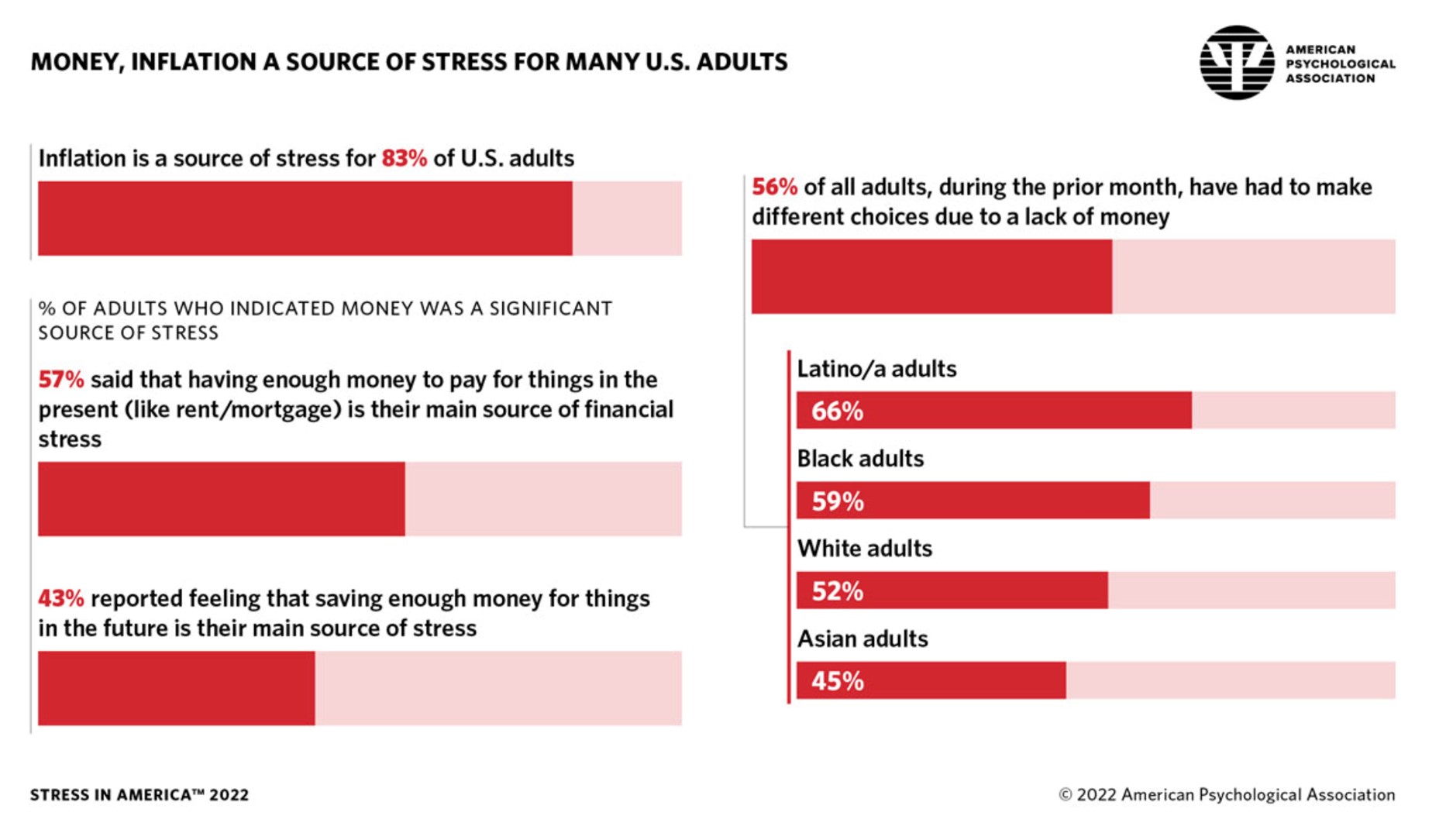
ECONOMY, INFLATION WORRIES REMAIN STEADY:
Today, 89% of Americans are concerned about the economy, inflation and jobs – the same high level as last week.
-
- 85% worry about a potential U.S. recession (no change)
- 82% about U.S. crime rates (down 1 point)
- 75% about political divisiveness (up 1 point)
- 74% about the War on Ukraine (no change)
- 72% about affording their living expenses (down 1 point)
- 61% about a new COVID-19 variant (up 1 point)
- 47% about losing their jobs (no change)
- 44% about the Monkeypox outbreak (down 4 points)
INFLATION IS AMERICA’S #1 STRESSOR:
How stressed are Americans, and what’s causing it? The answers are clear in the 2022 Stress in America survey we conducted with the American Psychological Association.
-
- 27% of Americans report being so stressed that they cannot function most days.
- Inflation is the #1 stressor for 83% of adults. That is followed by violence and crime (75%), the current political climate (66%) and the racial climate (62%).
- 76% say the future of the nation is a significant source of stress in their lives.
- 68% say this is the lowest point in our nation’s history that they can remember.
- 57% who indicated money was a worry said that having enough money to pay for things like food or rent/mortgage is their main source of stress.
- 43% reported feeling that saving enough money for things in the future is their main source of stress.
- 56% agreed that they and/or their family have had to make different choices due to lack of money in the past month, with Latino/a (66%) and Black Americans (59%) reporting this at a higher level than White (52%) and Asian (45%) American adults.
EMPLOYEES WARMING UP TO BACK-TO-OFFICE:
As we continue tracking return-to-office requirements, a majority of employees still say they will jump jobs if forced back to the office full-time. Yet the numbers of workers resisting return-to-office are much lower than three months ago, based on our survey with USA Today.
-
- 57% of employed Americans say companies will lose employees if they require workers to be in-person (down 9 points from June).
- 73% of remote and hybrid workers say they would find another remote or hybrid job if their company forced them to work from the office full-time (down 5 points from June).
- In an earlier study with Bloomberg, 57% of workers said they believe that employers now have more power in the job market (a 5-point increase in favor of employers from January).
INFLUENCERS MATTER:
Nearly half of U.S. consumers consider input from influencers when purchasing a product or service – especially younger people, according to our survey with AdAge.
-
- 80% of Gen Z consult user reviews before purchasing, and 75% say that recommendations from influencers affect their decision – nearly double the general population at 43%.
- 40% of Gen Z members have made purchases directly through an influencer’s storefront on sites like Amazon and LTK.
- 73% also report looking to TikTok creators for product input, with Instagram and YouTube influences being similarly popular choices.
BRANDS GETTING GEN Z RIGHT:
Beats by Dre, Jersey Mike’s Subs, Planned Parenthood, Lenovo and New Balance are doing the right things to capture the attention of Gen Z, according to the latest Ad Age-Harris Poll Gen Z brand tracker, a ranking of brands gaining the most attention from Gen Z members ages 18-24 in the third quarter.
-
- Also doing better with Gen Z are Kickstarter, Impossible Foods, Coach, Flex Seal, Foot Locker, Pillsbury, Haagen-Dazs, Bose, Nature Valley, North Face, Crocs, NHL, Paramount, Fiji and State Farm.
- See full details here.
ICYMI:
In case you missed it, check out some of the thought-leadership and happenings around Stagwell making news:
As always, if helpful, we would be happy to provide more info on any of these data or insights. Please do not hesitate to reach out.
Thank you.
Related
Articles
Augmented Reality, In the News, Marketing Frontiers
Apr 26, 2024
Legacy Brand, Meet Next-Gen Commerce: Bomb Pop Takes Roblox
Bomb Pop is the most popular ice pop that nobody…
Artificial Intelligence, In the News
Apr 25, 2024
Embracing Comfort Unapologetically with First-Ever AI-Powered La-Z-Boy ‘Decliner’
Building the first-ever AI-powered recliner for the brand that invented…
Augmented Reality
Apr 25, 2024
Playfully Navigating the Google Booth at CES
Google partnered with Left Field Labs to blend its physical…

